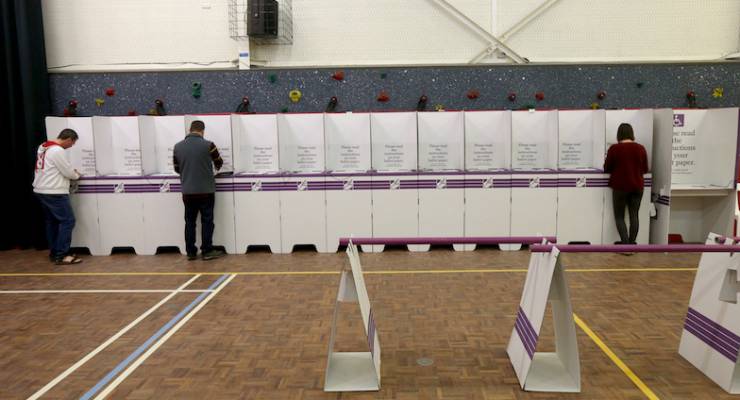
Australia’s rules for elections are “not adequate” for dealing with emergency situations like a pandemic or bushfires and must be changed, according to an alarming report released by a cross-party group of Australian politicians.
The Parliamentary Joint Standing Committee On Electoral Matters has made a number of recommendations as part of its inquiry into how to run an election during emergency situations.
These include giving new powers to the electoral commissioner to expand polling hours and making it easier for people to vote by mail or pre-poll.
But the Committee stopped short of saying that the Commissioner should have the power to change the date of polling — although the Committee’s report noted the lack of such a power is a “obvious omission which should be addressed”.
The report considered four Australian elections that were run during 2020: a federal by-election in Eden Monaro, Tasmanian and Northern Territory elections, and a local government election in Queensland.
Each election had changes in voting protocol to accommodate for the pandemic, including social distancing during in-person voting and expanded access to pre-polling day voting and postal voting. What they found was that elections became more expensive and more people used alternate forms of posting such as postal votes. There was no uniform change to turnout.
The Committee — chaired by LNP senator James McGrath, with members from the Nationals, Labor and Greens — acknowledged the benefit of both in-person and mail pre-polling day voting during emergency situations but hosed down the idea of expanding that beyond such scenarios.
“As it has consistently noted in previous inquiries, the Committee remains concerned about the extended pre-poll period becoming the norm for federal elections due to the impact it can have on the deliberative character of elections,” the report said.
The Committee also stood by its previous rejections of a universal online voting process due to concerns about security risks and cost, but noted its potential use as a possible solution in an emergency situation.
The federal Electoral Act is “deliberately prescriptive and offers little flexibility for how an election can be conducted”, the report says, and the events of 2020 show that it’s not adequate to run elections in emergency situations.
In response to a submission from the Australian Electoral Commission arguing for greater powers, the committee has suggested granting them — to an extent.
Their recommendations suggest changing the Electoral Act to allow the commissioner to add new reasons and make it easier to apply for pre-poll and postal voting, to add additional pre-polling times and to change rules around scrutineering.
These changes would require that the changes can only be used once an event of emergency has been declared and the commissioner must publish the decision as well as reporting to the committee.
The committee also found that there is currently no legal way to change an election date once set — something that’s an issue in the case of a serious emergency that prevents voting.
“There are currently no provisions in the Electoral Act to move a date for polling, however this is an obvious omission in the Electoral Act which should be addressed in circumstances where voting cannot occur on the date fixed for polling,” the report said.
But after concerns were raised about giving this power to the unelected electoral commissioner, the committee recommended changing the Act to allowing the date to be changed by either the state’s governor, the governor-general or the speaker of the House of Representatives.








How long before the LNP decides that elections are an unnecessary distraction in times of pandemic.
Here are the committee members one of whom is Larissa Waters
https://www.aph.gov.au/Parliamentary_Business/Committees/Joint/Electoral_Matters/Committee_Membership
“But after concerns were raised about giving this power to the unelected electoral commissioner, the committee recommended changing the Act to allowing the date to be changed by either the state’s governor, the governor-general or the speaker of the House of Representatives.”
So, instead, they prefered unelected vice-regal’s or the government’s chairperson? I’m sure there is a good argument that, being unelected, means the power to change an election date is probably best allocated to an independent commissioner who can decided the question on merit.
Just wait for the tabloid howls of any promotion of early and/or postal votes…..
allowing the date to be changed by either the state’s governor, the governor-general or the speaker of the House of Representatives.
Oh great, David Hurley. Defending Peta Credlin’s absurd OA
The governor general, David Hurley, said this year it “is important that the Order of Australia represents the diversity and strength of Australia”.
“I am prioritising increasing awareness of and engagement with the Order of Australia amongst groups that have been historically underrepresented,” he said.
Credlin joins a long list of people who should NEVER have received an award.